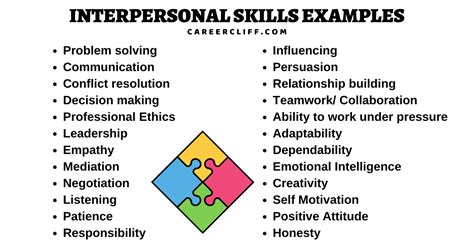Mastering Interpersonal Skills: Definitions, Examples & Enhancement

Interpersonal skills refer to the ability to communicate and interact effectively with others. It involves the capacity to understand and manage one’s emotions, communicate clearly, listen actively, negotiate conflict, and build relationships. These skills are essential for success in personal and professional life. In this post, we will explore the definitions, examples, and enhancement of interpersonal skills.
Definition of Interpersonal Skills
Interpersonal skills are the set of abilities that allow individuals to communicate, interact, and work effectively with others. These skills include verbal and nonverbal communication, active listening, empathy, conflict resolution, teamwork, and leadership.
Examples of Interpersonal Skills
Here are some examples of interpersonal skills:
- Verbal communication: ability to express ideas clearly and concisely through spoken words.
- Nonverbal communication: ability to convey messages through facial expressions, gestures, and body language.
- Active listening: ability to pay attention to what others are saying, ask questions, and show interest.
- Empathy: ability to understand and relate to the feelings and perspectives of others.
- Conflict resolution: ability to manage conflicts and find mutually acceptable solutions.
- Teamwork: ability to collaborate with others towards common goals.
- Leadership: ability to inspire, motivate, and guide others towards success.
Enhancement of Interpersonal Skills
Here are some ways to enhance your interpersonal skills:
- Practice active listening: pay attention to what others are saying, ask questions, and show interest.
- Develop empathy: try to understand and relate to the feelings and perspectives of others.
- Improve your communication skills: practice expressing your ideas clearly and concisely through spoken words and body language.
- Learn conflict resolution techniques: practice managing conflicts and finding mutually acceptable solutions.
- Participate in teamwork activities: practice collaborating with others towards common goals.
- Develop leadership skills: practice inspiring, motivating, and guiding others towards success.
- Get feedback: ask for feedback from others on your interpersonal skills and work on areas that need improvement.
- Seek training and development: attend workshops, courses, or coaching sessions that focus on interpersonal skills.
Conclusion
Interpersonal skills are crucial for personal and professional success. They involve the ability to communicate effectively, understand and manage emotions, negotiate conflict, and build relationships. By enhancing your interpersonal skills, you can improve your relationships, productivity, and career prospects.
FAQs
What are the benefits of improving interpersonal skills?
Improving interpersonal skills can lead to better relationships, increased productivity, and greater career success. It can help you communicate more effectively, manage conflicts, and build rapport with others.
Can interpersonal skills be learned?
Yes, interpersonal skills can be learned and improved through practice, feedback, and training. By developing these skills, you can become a more effective communicator, collaborator, and leader.
What are some common barriers to effective interpersonal communication?
Some common barriers to effective interpersonal communication include language barriers, cultural differences, lack of trust, defensiveness, and emotional barriers. By recognizing these barriers, you can work to overcome them and improve your communication skills.
How can I improve my active listening skills?
You can improve your active listening skills by paying attention to what others are saying, asking questions for clarification, summarizing what you hear, and showing interest through your body language and tone of voice.
What are some common conflict resolution techniques?
Some common conflict resolution techniques include active listening, compromise, collaboration, negotiation, and mediation. By learning and practicing these techniques, you can manage conflicts more effectively and find mutually acceptable solutions.
How can I develop empathy?
You can develop empathy by putting yourself in other people’s shoes, listening actively, recognizing and acknowledging their feelings, and showing compassion and understanding.
What are some effective leadership skills?
Some effective leadership skills include the ability to inspire and motivate others, communicate clearly and effectively, delegate tasks, give feedback, and lead by example. By developing these skills, you can become a more effective leader and achieve greater success in your personal and professional life.
